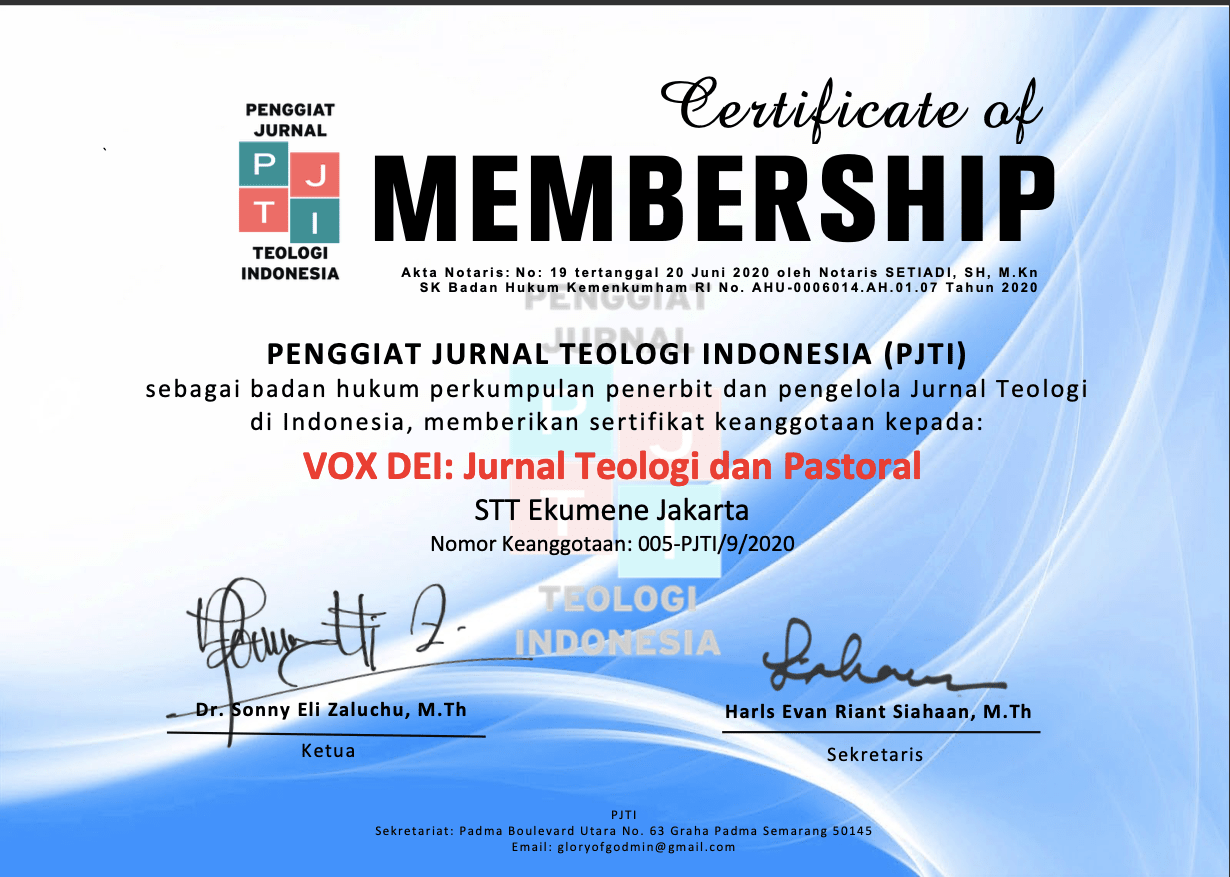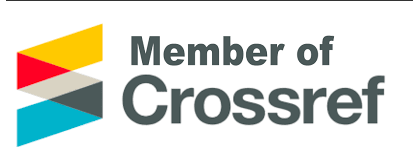Sedekah Melalui Perspektif Teologi Kontekstual Joseph Harrod Dalam Merespons Kesenjangan Sosial Ekonomi
Abstract
The global economic crisis has created a gap between the rich and the poor (socio-economic gap). The decline in the spirituality of religious people is proven by their reluctance to give alms and their neglect of the importance of the essence of alms. In fact, the practice of giving alms is a pragmatic act to realize the law of love for others that has been taught in Christianity. To address this social and spiritual issue, Joseph Harrod offers a new understanding of almsgiving. This article aims to tackle the problem of reluctance to give alms using Joseph Harrod's contextual theological perspective, namely the discipline of giving alms proactively, as a solution in responding to the socio-economic disparities experienced by society, especially within the Church. This study uses qualitative methods through text analysis and data collection through literature studies. The results of the study found that the concept of the discipline of proactive giving can bridge the socio-economic gap and renew the spiritual life of Christians.
Downloads
References
Banne, Eddy, And Daud Manno. 2020. “Menerapkan Makna Ibadah Menurut 1 Timotius Di Gereja Pantekosta Di Indonesia Jemaat Hosana Keerom Barat.” Epigraphe 4.
Friedman, Lawrence J., Ed. 2004. Charity, Philanthropy, And Civility In American History. 1. Paperback Ed. Cambridge: Cambridge University Press.
Guzik, David. 2016. Luke Verse By Verse Commentary. United State: Enduring Word Media.
Hananti, Vasika. 2022. “Tafsir Lukas 18:18-27 Dan Al Baqarah [2]:261-274 Sebagai Dasar Bersama Kristen-Islam Dalam Pengentasan Kemiskinan Di Indonesia.” Mitra Sriwijaya: Jurnal Teologi Dan Pendidikan Kristen 3(1):53–70. Doi: 10.46974/Ms.V3i1.53.
Harrod, Joseph C. 2019. “The Neglected Discipline Of Almsgiving.” Sage Journal 23. Doi: Https://Doi.Org/10.1177/1939790918812460.
Imeldawati, Tiur, Iwan Setiawan Tarigan, And Warseto Freddy Sihombing. 2021. “Sikap Waspada Terhadap Ketamakan Akan Kekayaan (Lukas 12:13-21).” Areopagus : Jurnal Pendidikan Dan Teologi Kristen 19(1):121–34. Doi: 10.46965/Ja.V19i1.608.
Islahiha, Nur Azmil, Nur Frita, And Reza Maulana. 2019. “Penerapan Sistem Perekonomian Syariah Dalam Mengatasi Kesenjangan Sosial Ekonomi Di Indonesia.” Pkm-P 3(2). Doi: 10.32832/Pkm-P.V3i2.472.
Jeremias, Joachim. 2016. Jerusalem In The Time Of Jesus: An Investigation Into Economic And Social Conditions During The New Testament Period. Peabody, Mass.: Hendrickson Publishers.
Larasati, Endang. 2022. “Badan Kebijakan Fiskal - Proyeksi Pertumbuhan Ekonomi Indonesia 2022 Dan 2023 Kuat Di Tengah Moderasi Pertumbuhan Ekonomi Global.” Retrieved September 7, 2022 (Https://Fiskal.Kemenkeu.Go.Id/Publikasi/Siaran-Pers-Detil/363).
Mulyono, Yehezkiel Sugeng, Hana Suparti, And Paulus Sentot Purwoko. 2021. “Implementasi Pengajaran Hidup Benar Menurut Roh Kudus Berdasarkan Galatia 5:16-26.”
Nugroho, Widianto. 2015. “Kristologi Kesanggrahan: Sebuah Tanggapan Atas Kemiskinan Dan Realitas Kesenjangan Ekonomi Di Indonesia.” Universitas Kristen Duta Wacana Yogyakarta, Yogyakarta.
Rhee, Helen. 2018. “Philanthropy And Human Flourishing In Patristic Theology.” Religions 9(11):362. Doi: 10.3390/Rel9110362.
Rizaldy, Gde Ngurah Reza, Kayla Nathania Thayeb, And Davin G. Sitompul. 2021. “Filantropi Kristen: Respons Tubuh Kristus Dalam Mengatasi Kemiskinan Pada Masa Pandemi Covid-19 Berdasarkan Kisah Para Rasul 2:44-45.” 14.
Schnabel, Eckhard J. 2012. Acts: Zondervan Exegetical Commentary On The New Testament. Grand Rapids, Michigan: Zondervan.
Siswanto, Anton. 2020. “Hamba Tuhan Dan Seni Memberi.” Excelsis Deo 16.
Sutoyo, Daniel. 2014. “Gaya Hidup Gereja Mula-Mula Yang Disukai Dalam Kisah Para Rasul 2: 42-47 Bagi Gereja Masa Kini.” Jurnal Antusias 3:40.























